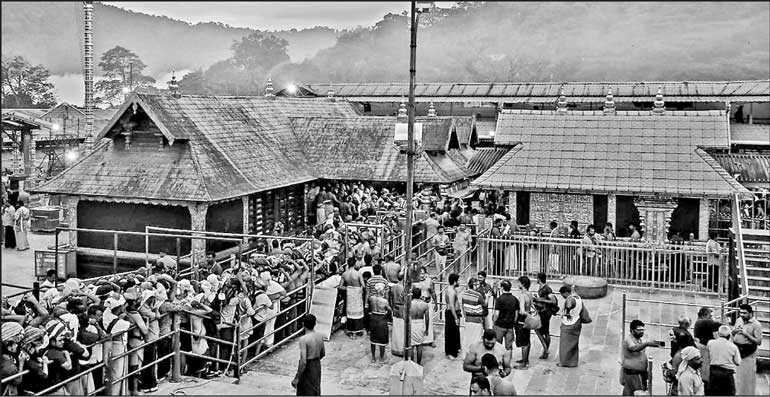Sunday Feb 22, 2026
Sunday Feb 22, 2026
Saturday, 16 November 2019 00:05 - - {{hitsCtrl.values.hits}}

Hindu devotees wait in queues inside the premises of the Sabarimala temple in Pathanamthitta district in the southern state of Kerala, India - Reuters
New Delhi (Reuters): India’s top court on Thursday delayed a verdict on the lifting of a centuries-old ban on women of menstruating age entering a Hindu temple, asking more judges to consider the case involving gender discrimination and religion that has divided opinion.
Upholding the right to equality of worship, a five-judge bench of the court last year ruled that the ban on women from entering the Sabarimala temple in Kerala could not be considered an essential religious practice and should be lifted.
The decision had enraged conservative Hindu groups, sparked protests and drew the Supreme Court into the controversy in what is still a deeply religious country.
Many devotees refused to abide by the ruling and subsequent attempts by women to visit the temple were blocked.
On Thursday, after examining about 60 petitions that sought a re-imposition of the ban, the court ruled that a larger, seven-judge bench would look at issues arising out of this case and three other pending cases of gender discrimination, in the minority Muslim and Parsi communities.
“The entry of women into places of worship is not limited to this temple only,” Chief Justice Ranjan Gogoi said while reading out the judgment.
Some lawyers and political analysts said the decision to scrutinise certain Hindu practices alongside those of other religions could pave the way for a public discussion on a uniform civil code, which is high on the agenda of Prime Minister Narendra Modi’s ruling Bharatiya Janata Party (BJP).
The BJP maintains that gender equality cannot be attained until the adoption of a uniform civil code, which is opposed by some Muslim groups since it would likely dilute sharia, the Islamic legal code.
“While the court cannot be faulted for doing what it is doing, but it definitely fulfils a major majoritarian demand. That if you’re trying to reform us (Hindus), reform them, too,” said political analyst Nilanjan Mukhopadhyay.
Pilgrimage season
Last week, a Supreme Court bench headed by Gogoi awarded a bitterly contested religious site in the city of Ayodhya to Hindus, helping Modi deliver on a long-standing promise to build a temple where a 16th-century mosque once stood.
In the ruling on the Sabarimala temple, the court has not issued a stay on its previous decision, effectively allowing all women to continue to visit the shrine, which is thronged by millions of devotees every year.
Those in favour of the ban argued it is necessary for rites related to the temple’s chief deity Ayyappan, who is considered eternally celibate.